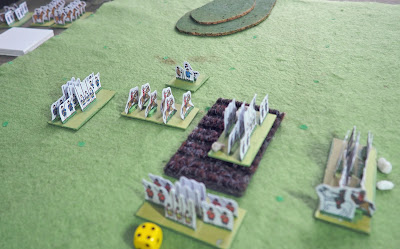I replayed the simple encounter battle I played the other day, but this time I used my Portable ECW rules. Once again the Royalists had a force strong in cavalry whilst Parliament's was strong in foot. The Royalists had a hill and some enclosures on their side of the field.
A view from behind Parliament's lines showing their impressive force of foot.
The Royalists, showing their strong cavalry contingent.
Early moves. Both sides had randomised deployments and ended up with their strongest force in a line across their front with the secondary arm to the rear. So Parliament advanced their foot, whilst the Royalists swung their horse across to their left.
This enabled the Royalists to make a strong, bold attack on their left flank, once that Parliament's forces actually held off.
Indeed steady fire from their dragoons actually routed one of the Royalist horse units.
In the centre and on their left Parliament was advancing well, and launching a strong attack on the enclosure. The Royalist dragoons put up less of a fight than did their Parliamentarian counterparts; outflanked and surrounded they quickly routed.
Parliament began to wrap around the Royalist right flank, with their horse threatening a sweep across the field to destroy the Royalist artillery.
Meanwhile on the other flank the Royalist horse was finally mopping up the enemy. But Parliament had foot units available to block any further attacks.
However Parliament's commander fell in the centre, leading the attack on the Royalists in the enclosure. This would hinder their activations for the next turn.
And overview of the battle. At he bottom of the picture parliament's troops can be seen exploiting their advantage over the Royalist right flank, whilst at the top Royalist horse are trying to exploit their advantage over Parliament's right flank.
Parliament swung their foot round to counter the Royalist horse. They had foot to spare.
One of the units got surrounded, but amazingly put up a strong fight and resisted the Royalist attacks again and again.
Meanwhile the Royalists were still holding on in the enclosures. But both armies were at their breakpoint, so were rolling to see if their army gave up at the start of each turn.
A unit of Parliamentarian foot broke ...
But the Royalists were then driven from the enclosures.
However Parliament then failed their morale test, and their army broke.
This was a much more interesting action than the OHW ECW version I played the other day. And I spotted a couple of possible tweaks to my Portable ECW wargame. The first is to do with when an army rolls to see if it breaks - to some extent once an opponent reaches their breakpoint there's no real incentive to keep pressing them since eventually they will fail their morale test. The obvious solution is that a side only takes a test if they've taken casualties since the last one; I just need to work out how to phrase that properly and in a way that makes it easy to keep track of. The second tweak is that foot with pikes who defeat horse should not pursue, so that will just be a slight rewording of the pursuit rules.
It occurs to me that I really need to write up my various changes to the published ECW Portable Wargame.


















Thanks for that report. I'd be interested in seeing your mods, and how they compare with all the other PW variants!
ReplyDeleteThanks. Obviously my mods will tie in with the ECW Portable Wargame, which is already a fairly well-modified version of the original game. But I suspect that the concepts are still ... portable :)
DeleteIt’s good to see your thinking on rule development.
ReplyDeleteMe too! One question about reaching breakpoints is whether that fact should be made known to one's opponent. You could argue that the army breakpoint represents their commander's awareness that his troops are now very brittle and liable to rout if pressed; or that it represents his own morale and confidence ebbing away and so should be kept secret from the opponent. Alternatively, one could argue that informing the opponent represents a general's perception of the enemy's condition, the realisation that they won't stand much more.
ReplyDeleteA tricky issue to resolve...
In deed a very tricky issue, but one to mull over. When it is a solo game, you know that the end is near and I find it is easy to see that the broken side would just start to crumble and drift off the battlefield as happened in many ECW battles and you do not have to convince your opponent!! Paul
ReplyDelete